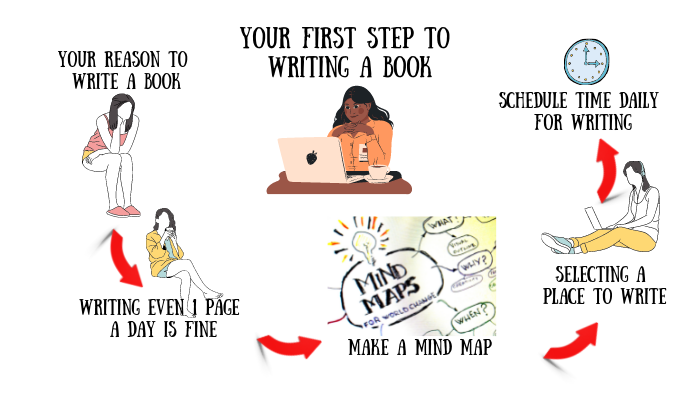
It is said that every individual has a story within him or her, waiting to be told! However, very few people end up becoming writers and authors. Out of all people who start writing only a fraction, around 3% complete writing their book!

That is because one does not know where or how to start, do not have a writing agenda or does not follow the golden writing rulers as stated below. Now, the secret is revealed – in just 3 easy and practical steps write your next book.
1. Writing a book- Well begun is half done
- The first step for a writer is to analyse his reasons to write a book. For many, the reason would be they love writing occasionally and would like to make it a hobby. Writing is a way of letting off steam or to deal with stress, earn fame, get speaking assignments. To make writing a source of earning money. Once you have analysed the reason for taking up writing follow the steps given.
- Little drops of water: For writing a book one does not have to have a torrent of words gushing out. Even writing 250 words a day is sufficient. And one does not have to give up one’s day job to become a writer. Writing 1 page a day either early morning or late at night is good enough.
- Making a mind map: It is important to have the broad outline of the book in your mind translated onto paper, it helps you keep on track. A table of contents is broken up into smaller sections. Each section of approximately the same length, this goes a long way in clarifying the writer’s thinking. As we all know, every story (and therefore every book) should have a beginning, a middle and an end. And the rest gets fleshed out more easily if the broad outline is at hand.
- Selecting a special place to write a book: It is best to avoid any humdrum, everyday place for writing, like the kitchen table or the bed. The writing place should be a special place dedicated to writing – once you enter, your mind should go into the writing zone.
- Scheduling time daily for writing your novel: Taking a break from writing is not a no-no. But plan for this in advance so that the deadline set does not pass. Stay committed to the schedule that you have set for yourself.

2. Remain accountable to yourself
- Breaking down the book into 10,000-word sections: Thinking in terms of ten thousand word sections is a good way to plan the book. This also helps to position the book appropriately. The number of words in a book?
-10,000 words: this is right for an article in a magazine or a leaflet or pamphlet
-20,000 words: good for a short eBook or novella
-40,000–50,000 words: apt nonfiction book
-50,000–60,000 words: normal fiction book or long nonfiction book
-80,000 words–100,000 words: a long novel
• For poetry a smaller word length of 5,000 -15,000
• Seeking feedback during the early stages of the book: Rewriting large sections of the book is a big dampener. It is a good idea to have a set of trusted advisors who can go over what is written and give frank feedback. If the previewer is not moved by the way the book is shaping up, a change in style or content early on may become necessary.
• Set weekly milestones: The milestones can be in terms of words or chapters completed or as a percentage of the book completed. Having deadlines allows the author to pace himself or herself and remain accountable to the schedule of writing the book.
3. Be positive
- Putting it out there: The book needs to be completed at any cost. Once the manuscript is ready, it should not be left in the drawer to obsess over till it is perfect. Sending it to the publisher, releasing it online or finding other ways to get it out in front of the target readers is critical.
• Being graceful in adversity: Getting it absolutely right the first time is rare. Therefore the author needs to be prepared for failing to meet his or her expectations from the book. And the expectations too must be realistic – perfection in any sphere of human activity is a mirage. Failure should be faced with grace and patience – and one has to learn the right lessons from the first book and come back with the second book.
• Go for another: If successful authors are polled, most of them will say that they are embarrassed by their first book. But writing the first book is a necessary first step in an author’s journey. The first book gives authors an opportunity to live through the process and learn the right lessons from it. The sooner the author launches the first book, the more time he or she has to write the subsequent books and taste success. Practice makes it perfect! - Interview with authors who explain their reasons to write and publish a book.
- All writers start with the first word. And most of them do it while living their current, everyday lives. What sets them apart is writing with sustained discipline day after day.
It is a popular myth that the number of readers is decreasing, in fact, according to the latest data* the number of readers have either increased or remained stable. Here is a look at how different age groups are taking to reading books.

Our advice to first time writers, new authors. Go for it, write the book that is close to your heart. You can achieve what you set out to do. Write in a language you are most comfortable with and on a topic you are familiar with or if the topic is close to your heart. Read related blogs
How to write a Best Selling Book?
Know all About Copyright For Books in India
Looking to publish a book? Contact us
Discover more from ZorbaBooks
Subscribe to get the latest posts sent to your email.
Superb & realistic guide for the budding writers. Excellent contribution.
Pingback: business books as a marketing tool in 4 easy steps
Pingback: How you can use your book to market your self
Pingback: What to write about
Pingback: Guidance for aspiring authors
Pingback: Writing a sucessful book with Nikhil Mahajan
Pingback: Why did 11 Indian Stars take to writing books
Pingback: Publish a Book - How do I publish my novel?
Pingback: Writing a Book that sells
Good suggestions. Thanks.
Thank you. Which suggestionresonates most with you?
Pingback: The Best Apps for Writing Your Book - ZorbaBooks
This is really encouraging. but when the expenses after writing, arise every encouragement melts down.
Pingback: Writing Built Courage in Me! - ZorbaBooks
Pingback: Six Easy Ways to Overcome the Writer's Block - ZorbaBooks